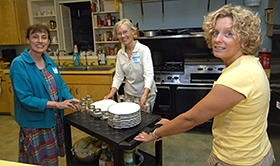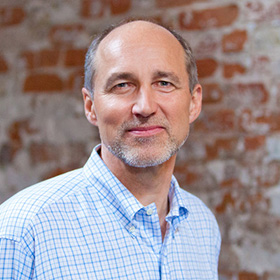In 2014, the founder and CEO of Family Promise, Karen Olson, told her board that she would retire after 28 years of leading the Summit, NJ-based provider of food, shelter, and support services for homeless families. When she then strongly recommended her operations director, Claas Ehlers, to replace her, the board was skeptical. After all, during Olson's tenure, Family Promise had grown from a single location in New Jersey into a complex, national organization guiding 207 affiliates that employ 170,000 volunteers nationwide.
Olson radiated charisma and purpose, and could bring stakeholders to tears with stories about guest families whose lives were changed through Family Promise. And now, the visionary behind the organization recommended her behind-the-scenes operations leader take her place. The board, led by Vice Chair Martin Wise and Chair Cary Hardy, had the final say. Wanting to respect Olson's wishes while observing due diligence, they created a reasonable plan: Ehlers would receive the opportunity "to articulate his vision, his kind of go-to-market plan for what he would do in the role," said Wise, "and to give him an opportunity to identify his own skill gaps."
Ehlers made the most of his opportunity. He came back with a transition plan that included a new ambassadorial position for Olson, organizational restructuring, and an overhaul of the board.
Best of all, the board concurred with Ehlers' recommendations, most of which were made in consultation with Olson and board members, leading to a series of changes that allowed Family Promise, led by Ehlers since 2016, to expand to some 220 affiliates and 180,000 volunteers.
The Bridgespan Group has published multiple articles on the topic of founder successions, focusing primarily on the importance of grooming successors, communicating to stakeholders, and working with boards to ensure ongoing daily operations and financial health. In the case of Family Promise, replacing the irreplaceable opened the door to reevaluate aspects of the organization and provide a new leadership path for Ehlers. Here's how the board, the founder, and the new CEO approached the successful transition.
Change #1: A New Role for the Founder
One of the first conversations between Olson and Ehlers had involved her future with the organization. They decided against a future board role to avoid confusion over who was in charge when the board and CEO disagreed on a decision. With board approval, they agreed instead on an ambassadorial role for Olson. In this unpaid role, Olson would attend some speaking engagements and key meetings and offer counsel to staff members at Ehlers' request.
The move proved remarkably deft, not only removing potential leadership conflicts but also creating a new organizational strength as Olson could devote herself to doing what she enjoyed most: inspiring people about the organization she founded. "People identified the organization with me and it was my life," Olson said. "But I had absolute confidence in Claas and knew that he would call on me as he needed."
Change #2: Organizational Structure and Culture
When Ehlers set about developing his transition plan, he quickly perceived that over the years, Family Promise had grown organically, with staff roles expanding to meet the increasing demands on the organization. The result, as Ehlers put it, was that "people didn't really understand what their job descriptions were." Even more alarming, he could say the same thing about himself. "I was the director of affiliate services, running all the programs, and had my hands in just about everything in the organization," Ehlers said. "The things I was doing were so well formed to me that, other than cloning me, it wasn't really possible to bring somebody in to do this."
To fix the issues, Ehlers engaged a staffing consultant to do an organizational audit that produced several key proposals. First, Ehlers solidified affiliate services, increasing the regional director team to four people, which would improve collaboration between the national office and its 200-plus affiliates. Second, he doubled down on the organization's fundraising capacity. Ehlers clarified development responsibilities, appointed Cara Bradshaw as chief impact officer to take them on, and built a team around her. Then, together with Olson, a successful fundraiser during her career, he began to establish key relationships with several donors. Finally, he and the board began recruiting new board members to tap new donation streams, further strengthening fundraising efforts.
On the culture front, Ehlers increased Family Promise's vacation from 10 days of paid time off to 15 days to strengthen its position when recruiting new talent. "We can't compete on salary, so vacation is very important. We had fallen well below industry standards," said Ehlers. He also improved opportunities for staff to work remotely, a cross-sector trend that—along with paid leave—has become increasingly a deal maker or breaker with prospective employees.
Finally, Ehlers promoted greater communication with monthly all-staff meetings as well as team-based meetings that encouraged the cross-fertilization of ideas between different groups.
Change #3: Board Engagement
When Ehlers began attending board meetings during the transition period, he discovered that the board Olson had built fit her style of leadership, but it didn't fit his. "The board was relatively a small part of the leadership equation," Ehlers recalled. "I said, 'That's not going to work for me, because I don't have the gravitas of having been the founder. I have skills, but they're much more operational. We need to make a stronger board.'"

Photo: Family Promise
Happily, Olson and the board all agreed. He encouraged more active participation from the board's four committees—Finance, Development, PR/Communications, and Board Development—to better engage their skills and expertise. "I really worked with the board," said Ehlers. "I told them I wanted to meet with them to talk about their plans for the year. We talked a lot about maximizing giving strategies and how the board could help us leverage big events with new prospects."
The upshot has been a sea change in the board's level of leadership and engagement. "There's no more passive approval," Ehlers said. "To the contrary, the board is fully engaged and its members are driven and strong-minded. This means sometimes there is a difference of opinion, and it has required me to advocate forcefully, but it's all good. It's been extremely positive for the organization and a key factor in our growth."
A Win-Win for Family Promise
The lesson emerging from the Family Promise story may be that it pays for a board to listen to the organization's founder during the succession process. "I love Family Promise, and I'd never do anything that wouldn't be beneficial to it, including promoting Claas," said Olson. In addition, the board's own commitment to due process gave Ehlers the freedom to show the board—and key stakeholders—what he could do. The result was a remarkably candid process in which board, founder, and successor were able to assess one another's strengths and weaknesses and project how those qualities would affect Family Promise over the long run. By guiding their decision-making with trust and respect, they updated Family Promise's culture and operations while preserving Olson's vision for the next generation.



